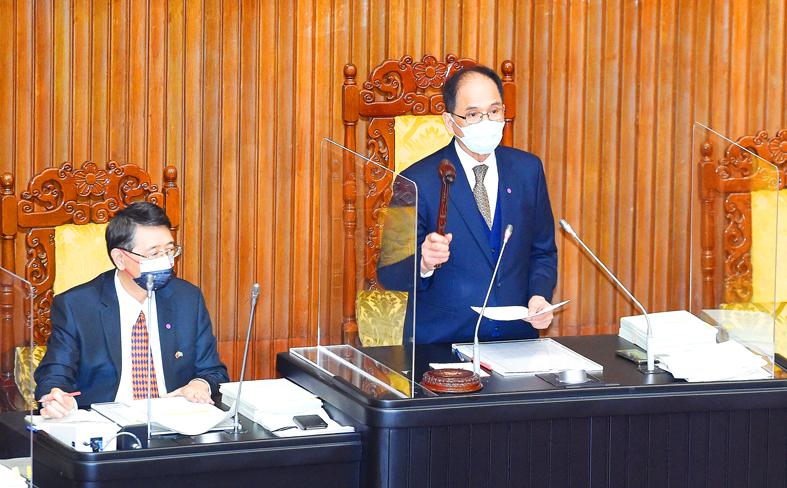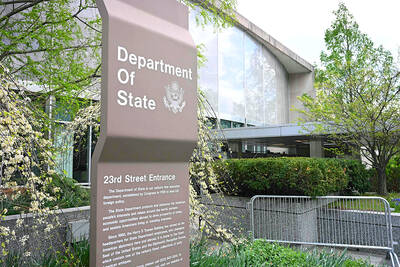The Legislative Yuan yesterday passed amendments to the Copyright Act (著作權法), Trademark Act (商標法) and Patent Act (專利法) as part of the nation’s push to join the Comprehensive and Progressive Agreement for Trans-Pacific Partnership (CPTPP).
The amendments — drafted by the Executive Yuan to bring the country’s intellectual property protections up to international standards — were taken to the floor without being negotiated in party caucuses after the parties voiced their agreement to the bills.
The bills now go to President Tsai Ing-wen (蔡英文), who is expected to sign them into law.

Photo: Liao Chen-huei, Taipei Times
The amendments to the Copyright Act are mainly aimed at closing a legal loophole that prevents criminal charges from being filed for acts of piracy that utilize a technology other than optical disks, the Ministry of Economic Affairs wrote in a report.
The amended law explicitly authorizes the prosecution of copyright infringements regardless of the medium or technology utilized in the replication or distribution of the material, the report said.
Non-digital copyright infringements — including those involving optical discs — are to be prosecuted only if there is an exact replication of commercially valued content and if the copyright owner suffers losses of more than NT$1 million (US$34,343), it said.
The limitations on the prosecution of copyright infringements are mandated by CPTPP rules, it said.
The Trademark Act amendments would no longer require a trademark infringement to be knowingly committed for civil or criminal liability, with negligence being a sufficient cause for civil compensation, it said.
According to the amendments, trademark infringements that occur in connection to the packaging of a product is a crime that carries a sentence of no more than one year in prison, which is commutable to a fine of less than NT$50,000, it said.
The penalties apply to unauthorized use of trademarks in advertisements on digital media or the Internet, it said.
The Patent Act amendments would allow the filing of patent claims for drugs still under patent evaluation, it said.

Hong Kong singer Eason Chan’s (陳奕迅) concerts in Kaohsiung this weekend have been postponed after he was diagnosed with Covid-19 this morning, the organizer said today. Chan’s “FEAR and DREAMS” concert which was scheduled to be held in the coming three days at the Kaohsiung Arena would be rescheduled to May 29, 30 and 31, while the three shows scheduled over the next weekend, from May 23 to 25, would be held as usual, Universal Music said in a statement. Ticket holders can apply for a full refund or attend the postponed concerts with the same seating, the organizer said. Refund arrangements would

Former president Tsai Ing-wen (蔡英文) on Monday called for greater cooperation between Taiwan, Lithuania and the EU to counter threats to information security, including attacks on undersea cables and other critical infrastructure. In a speech at Vilnius University in the Lithuanian capital, Tsai highlighted recent incidents in which vital undersea cables — essential for cross-border data transmission — were severed in the Taiwan Strait and the Baltic Sea over the past year. Taiwanese authorities suspect Chinese sabotage in the incidents near Taiwan’s waters, while EU leaders have said Russia is the likely culprit behind similar breaches in the Baltic. “Taiwan and our European

Taiwanese indie band Sunset Rollercoaster and South Korean outfit Hyukoh collectively received the most nominations at this year’s Golden Melody Awards, earning a total of seven nods from the jury on Wednesday. The bands collaborated on their 2024 album AAA, which received nominations for best band, best album producer, best album design and best vocal album recording. “Young Man,” a single from the album, earned nominations for song of the year and best music video, while another track, “Antenna,” also received a best music video nomination. Late Hong Kong-American singer Khalil Fong (方大同) was named the jury award winner for his 2024 album

The US Department of State on Monday reaffirmed that US policy on Taiwan remains unchanged, following US President Donald Trump’s use of the term “unification” while commenting on recent trade talks with China. Speaking at a wide-ranging press conference, Trump described what he viewed as progress in trade negotiations with China held in Geneva, Switzerland, over the weekend. “They’ve agreed to open China — fully open China, and I think it’s going to be fantastic for China. I think it’s going to be fantastic for us,” Trump said. “I think it’s going to be great for unification and peace.” Trump’s use of the